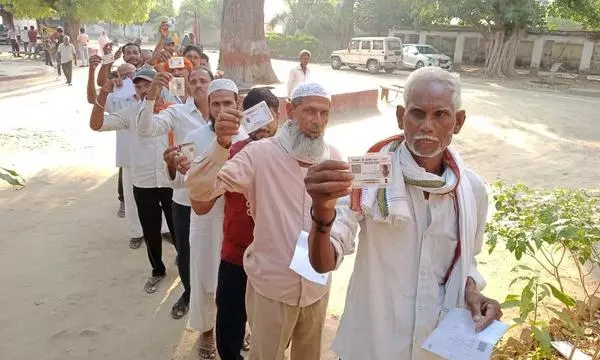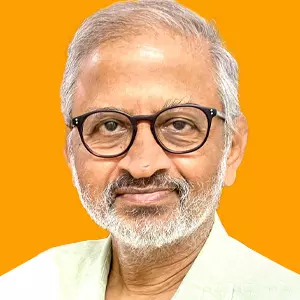
- Home
- India
- World
- Premium
- THE FEDERAL SPECIAL
- Analysis
- States
- Perspective
- Videos
- Sports
- Education
- Entertainment
- Elections
- Features
- Health
- Business
- Series
- In memoriam: Sheikh Mujibur Rahman
- Bishnoi's Men
- NEET TANGLE
- Economy Series
- Earth Day
- Kashmir’s Frozen Turbulence
- India@75
- The legend of Ramjanmabhoomi
- Liberalisation@30
- How to tame a dragon
- Celebrating biodiversity
- Farm Matters
- 50 days of solitude
- Bringing Migrants Home
- Budget 2020
- Jharkhand Votes
- The Federal Investigates
- The Federal Impact
- Vanishing Sand
- Gandhi @ 150
- Andhra Today
- Field report
- Operation Gulmarg
- Pandemic @1 Mn in India
- The Federal Year-End
- The Zero Year
- Science
- Brand studio
- Newsletter
- Elections 2024
- Events
- Home
- IndiaIndia
- World
- Analysis
- StatesStates
- PerspectivePerspective
- VideosVideos
- Sports
- Education
- Entertainment
- ElectionsElections
- Features
- Health
- BusinessBusiness
- Premium
- Loading...
Premium - Events

At this point, we should have a little more faith in the sagacity of Indian voters. Here is a take in response to Yogendra Yadav's recent article on ONOE
Anybody with even a cursory interest in recent Indian politics will concede the political acumen of Yogendra Yadav. He was the only voice reporting on his travels from the Hindi heartland in the mainstream media to question the BJP’s chances of securing a majority in the summer elections. He tweeted in the third week of April, after a trip across UP, that the state was going to witness a “political bhukamp”. Post the elections, he has appeared on numerous platforms - print, electronic, and public discourses - to ram home the fact that what was billed as a “coronation” was, in fact, a political defeat for Modi.
Also Read: Why One Nation One Election Plan raises more questions than answers
In making these significant interventions in the public discourse, he has drawn on the best of his many hats: one of the country’s leading political scientists, a formidable psephologist, author and writer, and most recently, a political activist. Whenever the occasion demanded it, he had drawn public attention to his many avatars and strived to separate them. He saw the latest election as one where Indian democracy was at the cliff’s edge. He was therefore upfront that he felt called upon to support the INDIA coalition as being best placed to prevent democracy from going over the edge. And now, of course, he has a column “Deshkaal” in the Indian Express.
Yogendra Yadav’s opposition to ONOE
My beef is with the September 24 column on his opposition to the Modi government’s proposal of One Nation, One Election (ONOE). As is his wont, he dissects and disrobes ONOE clinically and methodically and then presents his conclusion as a QED. Unusual for him, his coup de grace does not stand close scrutiny.
To assert that the Report on Simultaneous Elections in India by the high-level committee (HLC) led by former President Ram Nath Kovind was a “made-to-order document”, he begins his critique by listing some of its most absurd claims. To wit: Constant elections account for a loss of “about 300 days in an average year” in some states like Maharashtra. Or: “India is a combination of Presidential and Parliamentary forms of government.”
Also Read: Unclear roadmap, unanswered questions render 'One Nation, One Election' a pipedream
He then summons the report’s core argument in favour of ONOE: it would improve the “quality of governance” by cutting down on the diversion of government machinery, savings in state expenditure, and reduction in the time window of policy-freeze due to the Model Code of Conduct. He then parses these core arguments, strips them to their basic footprints, presents an alternative solution where the Election Commission rationalises the entire election playbook to reduce their disruption potential, and asks rhetorically, “When ordinary pills can do, where is the need for any surgery?”
Yadav’s core argument
Then he comes to his core argument and says that even if one grants all the benefits of ONOE, you need to judge it on the damage it would do to the constitutional democratic structure. The ONOE, he says, would “upset the basic principle of accountability of the executive to the legislature inherent in our parliamentary system of governance.”
And then, based on the HLC’s recommendation to align tenures even if the legislature’s remaining term was just one year, he concludes, “The proposal to align the tenure of state assemblies as well as municipal and panchayat bodies with Lok Sabha is a violation of the federal principle of governance. In this sense, the ONOE seems to be in violation of the “basic structure” of the Constitution.”
Contesting Yadav’s conclusions
Wait a minute. How are the two Yadav conclusions self-evident? How exactly does ONOE ipso facto rupture the accountability of the executive to the legislature? And how does it, again ipso facto, violate the federal principle of governance? Holding all the elections simultaneously is merely collapsing the timing of the elections: how does that make the polity any less federal? India had simultaneous elections to the Lok Sabha and the state assemblies till 1967, the largest part under Nehru; was our governance less federal then? And haven’t the most egregious assaults on federalism come from successive Prime Ministers?
The Constitution, we know, was more unitary than federal because it was birthed at a time when it was paramount to stitch India into one nation and keep it so. It is also acknowledged that Nehru’s arrest of Sheikh Abdullah in 1953, as the first attack on the commitments enshrined in Article 370, and his dismissal of the Communist government in Kerala in 1959 were perhaps the most significant early assertions of a strong Centre. But then, Nehru had the sagacity to roll back his opposition to the reorganisation of states on a linguistic basis, acknowledging that the democratic assertion of an identity based on language affinities should supersede his fear of embedding fissiparous identities.
The govts that have challenged federalism
In more recent times, the Indira Gandhi and the Modi-Shah governments have been the most aggressive Central rulers in challenging the word and spirit of federalism. It started with the cynical use of Article 356 to dismiss elected governments under Mrs Gandhi. Under the Modi-Shah government, the tools have been maverick governors, compliant central agencies, and measures to raise levies from the people in such a manner as to diminish the share of states.
Yadav goes on to discuss the real reason behind ONOE — the significant political advantages that the ruling BJP sees in it. The reasons are well known: Modi’s high personal popularity; the BJP being the party with, by far, the best resources, not only financial and usurious but also in the strength of its own cadre and organisation and the backing of the Sangh Parivar and its many offsprings.
ONOE is, indeed, just another manifestation of the “saam, daam, dhand, bhed” 24x7-style of Modi-Shah politics, which shows no signs of moderation despite the June verdict setback.
Maturity of Indian voter
But should we not at this point invest a little more faith in the sagacity of the Indian voter? A rejuvenated INDIA alliance undoubtedly played a role, but who would deny that it was the maturity of the Indian voter that thwarted the June “coronation”.
Yadav tells this lovely tale of what a wise old man told him on his election tour when he asked him what he thought of giving Modi a third-term: “Dekhiye, jab ham kissiko Mukhiya banatey hain toh pahli bar imandari sey kaam karta hai. Jab doosri baar ussey phir Mukhiya chuntey hai toh thoda bahut hera feri karney lagta hai. But jab ussey ham teesri baat Mukhiya banatey hain to woh hamare sar pey naachney lagta hai.” (The first-time Mukhiya works diligently; elected again, he begins to line his pockets; elected for the third time, he will dance on our heads!).
Biggest problem – money power
The deepest problem regarding elections is the death-like embrace of money power. In Goa, where I live, I recall the horror with which a prominent Goan recounted that the BJP was spending close to ₹10 lakh per panchayat member in a panchayat election. And Goa has 191 panchayats and all local bodies have five panches!
It is also true that all parties are united on one issue: sabotaging any attempt to institute election finance reform. True federalism, like democracy, is a serious work in progress in India.
In the 75th year of the Republic, it is time to let ONOE be contested in the political arena. Even if the unlikely were to pass and it makes it through the legislatures, it will become yet another defining test for the Supreme Court. Let that whole contestation happen in the public gaze. There really is no need to summon red herrings to defeat this contest.
(The Federal seeks to present views and opinions from all sides of the spectrum. The information, ideas or opinions in the articles are of the author and do not necessarily reflect the views of The Federal)


